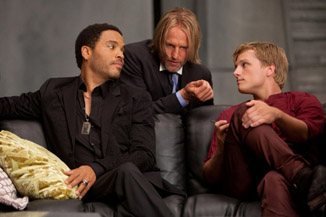Movie Review: The Hunger Games
By Matthew Huntley
April 2, 2012
BoxOfficeProphets.com

True, the underlying story and themes are familiar and have been a part of literature and film, particularly science fiction, for quite some time. It takes place in a futuristic, post-apocalyptic world, where North America has been combined into one country known as Panem, and there are 12 subordinate districts, each overseen by the ruling Capitol government. Every year, as penance for war and attempting to rebel against the Capitol, two members from each district, between the ages of 12 and 18, are randomly chosen via a lottery system to compete in The Hunger Games, a fight-to-the-death match in a controlled arena, where trees, fires and animals can turn up at a moment’s notice. If this premise reminds you of The Most Dangerous Game, 1984, Battle Royale, or any of the like, you’re not alone.
Among the competing kids, known as “tributes,” are Katniss Everdeen (Jennifer Lawrence), who volunteers for the program so her younger sister can be spared, and Peeta Mellark (Josh Hutcherson). Both are 16 and come from poor families in District 12. But Katniss is a fighter, and ever since her father’s death, she’s been the main provider for her mother and sister. Lucky for them she’s an excellent shot with her bow and arrow and uses her skills to kill squirrels and deer, which, in this society, can be valuable bargaining chips. In the back of Katniss’ mind, she’s probably thought about using her weapons on other human beings, if only as a means to escape.
The themes in The Hunger Games are not especially original, particularly the idea of witnessing violence and competition via media (The Hunger Games are televised for all to see), but they’re still powerful. If there’s one thing that intrigues us just as much as violence and competition, it’s stories that depict our fascination with violence and competition.
We follow Katniss and Peeta as they train with the 22 other young people from the separate districts. They’re groomed and watched over by their mentor, Haymitch Abernathy (well-played by Woody Harrelson), stylist Cinna (Lenny Kravitz), and escort, the loudly dressed Effie Trinket (Elizabeth Banks). The screenplay does a good job of filling us in on the rules of The Hunger Games without being overt. We learn, for instance, the way to survive is to get people to like you, and not just the people trying to kill you, but members of the Capitol who can serve as sponsors. Because when the games start, you never know when ointment, medicine or water will come in handy. “Water,” Haymitch says, “will quickly become your new best friend.”
The training and competition scenes are exciting and well told. Despite how much story there is to get through, director and co-writer Gary Ross doesn’t rush things and lets the narrative unfold gradually, allowing us to gain a real sense of the danger and dread these kids are about to embark upon. The movie doesn’t glorify violence, either. It knows it’s disturbing, and although it’s tastefully done, it’s still eerie, and it makes us shudder.
It’s also unnerving to think that members of the Capitol, including the Hunger Games host, Caesar Flickerman (Stanley Tucci), coordinator Seneca Crane (Wes Bentley), and President Snow (Donald Sutherland), aren’t that farfetched as characters, especially in the way they speak so flippantly about kids killing each other in the name of entertainment and maintaining control. But when the countdown begins and the 24 kids are left to destroy one another, our hearts sink, and because kids are inherently innocent and inexperienced, we’re not rooting for any one of them to perish, including the obligatory jerks.
As science fiction, The Hunger Game is bold and inventive. As a social commentary, it’s strong and brutal. We walk away from it not envious of the characters but sympathetic toward them. And, as a film, it’s well made, performed and designed. The filmmakers have created a vibrant, distinct world, which they don’t go out of their way to show off. The look and appearance are weaved in, but they come second to immersing us in the story.
Do I dare start reading the trilogy now, before the next two adaptations? Perhaps, because The Hunger Games has imbued me with enough confidence to think I’d enjoy the films no matter what. That’s not necessarily a sign the filmmakers adapted the source novel well, but rather, simply, that they made a good movie.